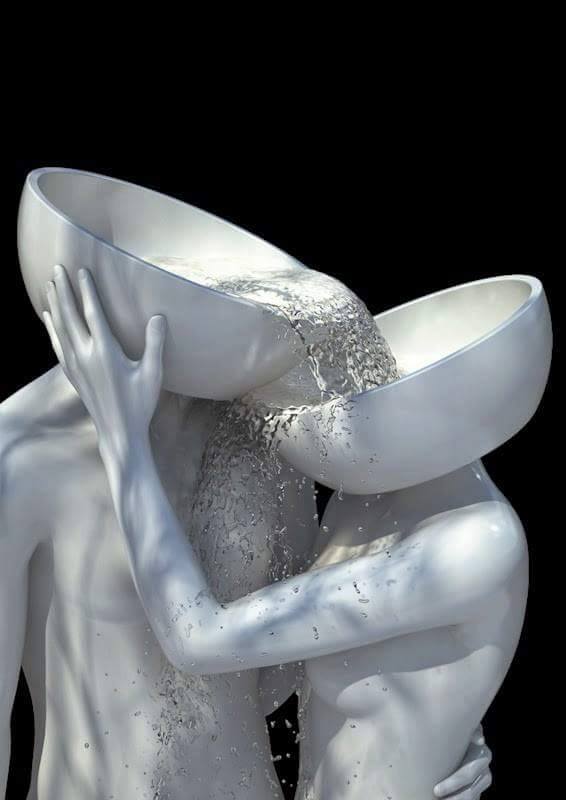Infinite Influences
By: Steven Van Neste
Nothing is, perhaps, scarier than the idea of brainwashing; so much so that some even go as far as to deny there is such a thing. What brainwashing exactly is, seems rather difficult to answer, however, what should be inquired into first, is just as to why brainwashing is so frightening, as well as the more general topic of cults and cultish influences.

Some may liken the entire complex to a form of modern slavery, and though there is a definite truth to this, it also does not appear to be entirely accurate. The reason is that slavery is always, more or less, a corporeal event and in most cases is something that goes against the will; the fears of brainwashing and cultish influence, however, are precisely because they seem to infiltrate inside (and operates within) our concept of free will.
If we were to watch a movie involving slavery, then this usually will not translate into fear, because (at least in the Western Hemisphere) we have become accustomed to our liberal ways of life. Even more so, it is something that can be fought against; the best example of which is the Haitian slave revolution at the end of the 18th century. The fear of brainwashing is, however, more severe than this because it turns us into something worse than a slave.
The classical image of brainwashing victims (and often of cult members in general) is that of a zombie, and though many professionals would warn against this image, it must be understood, that this is how most will see the situation and hence why it is something so feared.
What we fear above all is someone turning us into something other than ourselves. As such the fear of cultish influence is not just a fear of enslavement, but more importantly is a fear of finding our entire sense of self-hijacked. Where the zombie metaphor fails, however, is that it tends to portray it all as something simplistic, especially since it tends to make us believe cult members in general, are like brainless tools; this, however, is not the case, since the attack is usually never upon our intelligence, but as aforementioned upon our sense of self.

If cultish influence purposes a danger of enslavement, then it is on a deeper level than the one we are used to, as it involves not so much simple physical coercion, as rather it operates on a more grayish psycho-physical level. The aim of classical slavery was usually one of mere labor, as such, it usually was a process restricted to physical aggression, and there was little care about the mind. In other words, in classical slavery, the masters did not care whether or not it was the slaves will to obey, whereas, within the context of cultish influence, the mind is central to everything, as the cult demands not only a performing body, but more importantly demands a willing mind.
But what is a cult? We all seem to know what it means, yet proper definition always escapes us. In one of its simplest forms, a cult could be described as an organization imposing its will upon the individual, thusly alienating said individual from society. Looking at the classical image of the cult, the first part of this description seems rather accurate, however, the latter part is more problematic, since it relates more to communes than it does to cults as such.

What exists at the margins of society is always a part of society and hence it cannot ever be simply discarded without damaging society itself. The error many people make, is to imagine the marginal can just be scraped away and what will remain shall be an omnipresent cohesiveness. However, society cannot exist without its boundaries and hence the marginal cannot ever be scraped away; figuratively, the cohesiveness of the inner-city can exist solely because of the fringes surrounding it.
What must be examined now, first of all, is not the cult itself, but rather the reason as to why we are scared of cults. Why must there be an awareness, and what is the real point/agenda of this awareness? The error of many self-styled cult experts, is often that they are so busy looking to the outside, that they forget to look back inside society itself. There are dangerous and destructive cults out there, this is for sure, yet it is not as simple as that, and hence this should not be seen as an excuse to not inquire into our ‘accepted’ society.
People who fight against cults tend to have the mistaken belief that since cults exist in the margins, that they are nourished there as well, this however is simply not so. A cult may be born and exist at the fringes of society, but what nourishes it is always society itself. Looking at the most frightening image of them all, The Peoples Temple, we find its impetus was not at all to exist at the fringes of society, but rather to transform society. Cults often are formed not because they are against society as such, but rather because they wish for a different society, and if they move to the fringes, then this is only because there are irreconcilable differences between the two.
Hi! I am a robot. I just upvoted you! I found similar content that readers might be interested in:
https://medium.com/@debravanneste/infinite-influences-c4dd1d5d5ad4
Downvoting a post can decrease pending rewards and make it less visible. Common reasons:
Submit
Beautiful post
Downvoting a post can decrease pending rewards and make it less visible. Common reasons:
Submit